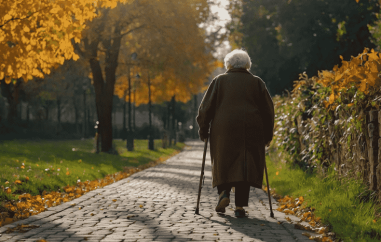Healthy Aging: Tips for Seniors
 As the population continues to age, the importance of maintaining health and vitality in the senior years becomes increasingly paramount. Healthy aging is not just about living longer; it's about living well. In this article, we explore essential tips and strategies for seniors to enhance their physical, mental, and emotional well-being, enabling them to enjoy a fulfilling and active lifestyle as they age gracefully.
As the population continues to age, the importance of maintaining health and vitality in the senior years becomes increasingly paramount. Healthy aging is not just about living longer; it's about living well. In this article, we explore essential tips and strategies for seniors to enhance their physical, mental, and emotional well-being, enabling them to enjoy a fulfilling and active lifestyle as they age gracefully.
1. Prioritize Physical Activity:
Regular exercise is key to healthy aging, offering a myriad of benefits for both physical and mental health. Seniors should aim for a combination of aerobic, strength, flexibility, and balance exercises. Activities such as walking, swimming, yoga, and tai chi are excellent options that cater to varying fitness levels. Even gentle exercises can improve cardiovascular health, maintain muscle strength, enhance flexibility, and reduce the risk of falls.
2. Maintain a Balanced Diet:
Nutrition plays a crucial role in promoting health and longevity. Seniors should focus on consuming a well-balanced diet rich in fruits, vegetables, whole grains, lean proteins, and healthy fats. Adequate hydration is also essential for optimal health. Additionally, older adults may benefit from consulting with a nutritionist or dietitian to address any specific dietary needs or concerns, such as managing chronic conditions or medication interactions.
3. Stay Socially Connected:
Maintaining social connections is vital for mental and emotional well-being. Seniors should prioritize spending time with friends, family, and community members, whether through social gatherings, volunteering, or joining clubs and organizations. Engaging in meaningful social activities can combat loneliness, boost mood, and provide a sense of belonging and purpose.
4. Prioritize Mental Health:
Cognitive health is an integral aspect of healthy aging. Seniors should engage in activities that stimulate the mind, such as reading, puzzles, learning new skills, or participating in brain-training exercises. Additionally, practicing relaxation techniques, mindfulness, and stress management can help reduce anxiety and improve overall mental well-being.
5. Get Regular Health Check-ups:
Preventive healthcare is essential for detecting and managing health conditions early on. Seniors should schedule regular check-ups with their healthcare provider, including screenings for conditions such as hypertension, diabetes, osteoporosis, and certain cancers. Vaccinations, including the flu shot and pneumococcal vaccine, are also important for maintaining immunity and preventing illness.
6. Prioritize Sleep:
Quality sleep is essential for overall health and well-being. Seniors should aim for 7-9 hours of sleep per night and prioritize establishing healthy sleep habits. This includes maintaining a consistent sleep schedule, creating a relaxing bedtime routine, and ensuring a comfortable sleep environment free of distractions.
7. Practice Safety Measures:
Preventing accidents and injuries is crucial for maintaining independence and well-being in later life. Seniors should take steps to ensure their home environment is safe and accessible, including installing handrails, removing tripping hazards, and improving lighting. Additionally, using mobility aids as needed, such as canes or walkers, can help prevent falls and injuries.
8. Stay Active Mentally:
Continued learning and mental stimulation are important for cognitive health. Seniors should seek out opportunities for lifelong learning, whether through classes, workshops, or online courses. Engaging in hobbies and creative pursuits can also provide mental stimulation and fulfillment.
9. Cultivate a Positive Mindset:
Maintaining a positive attitude and outlook on life can have profound effects on overall well-being. Seniors should focus on gratitude, resilience, and optimism, even in the face of challenges. Practicing mindfulness and self-compassion can help cultivate a positive mindset and enhance emotional resilience.
10. Seek Support When Needed:
It's essential for seniors to recognize when they need assistance and to seek support from family members, friends, or healthcare professionals. Whether it's managing chronic health conditions, navigating emotional challenges, or accessing community resources, there is no shame in asking for help when needed.
In conclusion, healthy aging is achievable with the right mindset and lifestyle habits in place. By prioritizing physical activity, nutrition, social connections, mental health, preventive healthcare, sleep, safety measures, continued learning, positivity, and seeking support when needed, seniors can enhance their quality of life and enjoy a fulfilling and vibrant later life. Embracing these tips can empower seniors to age gracefully and maintain independence, vitality, and well-being for years to come.
Image by Gerd Altmann from Pixabay















































